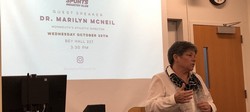Vice President and Director of Monmouth Athletics Marilyn McNeil, Ph.D., spoke with members of the Sports Industry Club for their weekly guest speaker series. The reoccurring program aims to allow students with an interest in sports-related careers to engage with tri-state professionals and alumni.
During her speech, McNeil not only detailed the many difficulties of her career’s progression, but related these moments to the topic of gender inequality.
Originally from Canada, McNeil spent around five years teaching and coaching Women’s Basketball at Montreal’s McGill University before returning to her alma mater, the University of Calgary, to coach their Women’s Basketball program.
After learning of unequal pay between her and the University’s Men’s Basketball coach, McNeil approached the school’s athletic director with an ultimatum: re-consider her contract, or the search for other opportunities would begin.
“I went to our athletic director and said, ‘I know we’re not as important as Men’s Basketball, but I need from you a sense that you care about Women’s Basketball. I need a sense that you see a future about Women’s Basketball, and I’d like a longer term contract and I’d like a raise. You don’t have to put me where he is, but I want at least a forward thinking movement here,’” McNeil recalled.
The athletic director did not budge on raising McNeil’s pay. In search of greener pastures with more balanced contracts, she left. By the suggestion of her husband, McNeil applied for a coaching position at California Polytechnic State University. According to McNeil, only two women applied for the position, and she was eventually given the offer.
“I didn’t want to go since my entire family was in Canada,” McNeil said. “We both had good jobs and good friends, but at the same time I knew I couldn’t stay where I was because someone had to make a statement. Soon after, I’m walking down the hallway with my new boss in California and he says, ‘You’re the first woman coach we’ve had here at Cal-Poly, and nobody is really happy about it.’”
After observing athletic directors for years from each respective University she worked for, McNeil felt it was time to take a chance at becoming one herself.
“There was this great advertisement for Monmouth College at the time,” McNeil said. “They just added a football program, and I thought I’d throw my name in the hat.”
“Trying to get a job as an athletic director is very difficult for women, even today,” she added. “When I came [to Monmouth], I was one of 22 nationwide as a woman in Division 1 athletics. Today, I’m one of 40, and that’s 26 years later. There’s more progress being made but it’s still a tough climb.”
While telling her story, McNeil touched on the topic of a possible “Sports Management” major coming to the Monmouth undergraduate curriculum, and she detailed concerns regarding the difficulty of finding a job with such a narrow concentration.
“I’ve basically been a nay-sayer of a possible management program because one of the issues that comes up is that I just don’t know if there’s enough jobs on the other side,” McNeil said. “[That major] would only allow you to go into Sport Management. Becoming a Business Major allows you to get the same jobs, as sports is the same as any other management. It’s not really different, just perhaps a little bit more glamorous in some ways.”
McNeil describes entering the sports world as a “business of contacts,” and internships as well as keeping bridges from being burned are crucial to landing a job.
“You will need to do some pretty nitty-gritty dirty work, but if you just stick to it and pay attention to who you’re working for, you never know if they’re going to become the next associate athletic director,” McNeil said.
There are more ways to enter the sports world than defining your major as such, McNeil said. Those with degrees in law have become important to college athletics, as lawyers are necessary to wade the waters of sports betting, controversy around paying players and so on.
“With the lawsuits and the compliance that we have to do, keeping everybody on point and keeping people out of trouble is very important,” McNeil said. “New Jersey has passed sports betting into law, and that’s very scary for us. For example, I worry about someone coming into our Men’s Basketball practice and finding out that a player won’t be on the court for two weeks, and that person goes off and places a bet in Pennsylvania on our next game. Does it get back to the player? Can he get himself in trouble for unknowingly being involved in a betting situation? I have to warn our board of trustees, all our coaches and all the staff about not sharing information about the health of our student athletes.”
Max Sobrano, a recent graduate of the Leon Hess School of Business and co-founder/former President of the Sports Industry Club, lauded McNeil’s speech for its unique and raw perspective on her experiences in the college athletic industry.
“Dr. McNeil’s speech was great, not only because it gave a woman’s perspective about getting into sports, but she told personal stories about her troubles getting into the industry,” Sobrano said. “I really liked how she didn’t sugarcoat anything and told it how it is. The sports industry, I know for a fact, is not an easy thing to get into for anyone regardless of you striving for college or the professional level. One thing we are really striving for is to have more women speakers as half of our club is made up of women college students who have an interest in sports. She is one of our many talented women speakers for this year.”
PHOTO TAKEN by Matthew Cutillo



